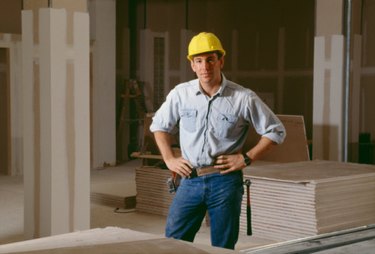
Drywall that is five-eighths of an inch thick provides more soundproofing than thinner types of drywall. It also provides an increased degree of fire protection. Local building codes might require you to install five-eighths-inch drywall in areas near heating appliances and in garages. The goal of these regulations is to keep fires from traveling quickly from high-risk areas to inhabited parts of the homes. Installing five-eighths-inch drywall requires screws of the proper length to ensure maximum stability.
Types
Video of the Day
Drywall screws come in several varieties and in many sizes. The two types of screws you might use to install five-eighths-inch drywall are types W and S. Type W screws are suitable for wood framing. Type S screws are designed to penetrate steel framing.
Video of the Day
Screw Size for Wood Framing
To support a board of drywall on wood framing, use type W screws that penetrate the wood studs at least five-eighths of an inch. To determine if a screw is the correct length, subtract the width of the drywall you are installing from the length of the screw. If the result is five eighths of an inch or greater, the screw is of adequate length. For example, if you are installing five-eighths-inch drywall, you'll need screws that are 1 1/4 inch or longer.
Screw Size for Steel Framing
For steel framing, the screw only needs to penetrate three-eighths of an inch. This means that installing five-eighths-inch drywall over steel framing requires screws that are 1 inch or longer. For heavy-gauge steel framing, use drill-point type S screws. Fine-threaded type S screws are suitable for light-gauge steel framing, which is the type of steel framing most common in residential construction.
Considerations
Note that using longer screws won't hurt, but it won't make an installation more stable. Longer screws typically cost more and require more effort to install, so choose the shortest screws possible without compromising the stability of the installation.